Our most recent MCHS picnic took place in Woodstock, Ontario on October 4, 2023
The Boat Pavilion at Southside Park in Woodstock has turned out to be a great venue – one of several such venues – for our Malcolm Campbell High School picnics in Southwestern Ontario. (We’ve also been meeting regularly for picnics in Toronto.) We owe many thanks to Gina Cayer for recommending the park as a venue.
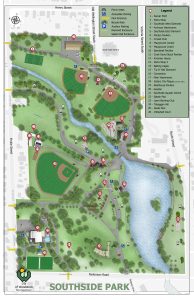
We met at a picnic table near the Boathouse Pavilion – No. 19. Source: City of Woodstock – Parks & Recreation Department. FOR LARGER VERSION SEE BOTTOM OF CURRENT POST
Our first get together in Woodstock was three years ago on August 20, 2020. At that time the Covid pandemic was at an early stage. There’s a roof over the Boat Pavilion meaning there’s no problem if it rains; as well, there’s a washroom nearby. Our second meeting at this location was on October 5, 2022; our third was on October 4, 2023. There were four of us at the latter event – Gina Cayer, May Jolliffe, Scott Munro, and Jaan Pill.
On October 4, 2023 we met at Southside Park in the shade on a day of 27 degrees Celsius. That’s a hot day but because we were in the shade with lots of trees around us, it did not feel hot. It actually felt quite cool, even at a time when heat records worldwide are getting broken all the time. An October 5, 2023 CBC article, entitled “Steamy September caps record-shattering summer — and scientists warn trend shows no sign of stopping,” underlines the ongoing trend.
An Ontario Doors Open website describes Southside Park as follows:
Southside Park is the largest park in Woodstock. Opened in 1909, the park is home to many beautiful gardens, walking trails and sports fields. Some of the historical features include the pond (1914), the boathouse and bathing house (1914-18), the pavilion (1918) and the memorial arch (1925).
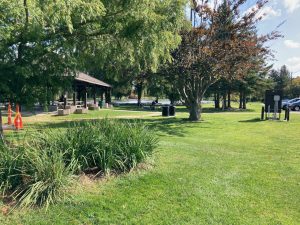
October 4, 2023, MCHS Woodstock picnic. We met at a picnic table next to the Boat Pavilion. Jaan Pill photo
Books by and about George Orwell
We spoke about a lot of things at our picnic in Woodstock. Some days later, I travelled for a second time to Woodstock from Stratford where I live. On the second occasion, I was there to get my seventh Covid vaccination. I like to keep up to date with my Covid vaccinations. Among the many people we talked about at our picnic was George Orwell. At this post, I will restrict myself to just a few words about Orwell.
After reading about Orwell recently, I have a much better understanding of the distinction between the far left and left. In particular, Why Orwell Matters (2002) by Christopher Hitchens outlines the distinction in a way that I’ve found easy to follow. Hitchens addresses the distinction in Chapter 2, “Orwell and the Left” – and elsewhere in the book as well. [1]
Why Orwell Matters (2002)
A quote from Chapter 1, “Orwell and Empire” (p. 34) highlights Hitchens’ essay / biography:
It might not be too much to say that the clarity and courage of Orwell’s prose, which made him so readily translatable for Poles and Ukrainians, also played a part in making English a non-imperial lingua franca. In any event, his writings on colonialism are an indissoluble part of his lifelong engagement with the subjects of power and cruelty and force, and the crude yet subtle relationship between the dominator and the dominated. Since one of the great developments of his time and ours is the gradual emancipation of the formerly colonized world, and its increasing presence through migration and exile in the lands of the ‘West’, Orwell can be read as one of the founders of the discipline of post-colonialism, as well as one of the literary registers of the historic transition of Britain from an imperial and monochrome (and paradoxically insular) society to a multicultural and multi-ethnic one.
The extract mentions Ukrainians. I follow regular updates about the war in Ukraine from analysts such as Phillips P. O’Brien. Recently, I also attended some weekend events at the Tom Patterson Theatre in Stratford connected with the war:
George Orwell and Russia (2023)
In other reading about George Orwell, I recently came across a September 11, 2023 New Eastern Europe article by Marsha Karp entitled: “Orwell’s warning of totalitarianism for today: A review of George Orwell and Russia.” I found the article of interest.
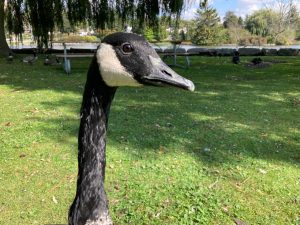
October 4, 2023, Woodstock picnic. The goose had no complaints about me walking up close to take a picture. Jaan Pill photo
An excerpt reads:
Karp’s book, George Orwell and Russia, answers this question. It is published in the context of Vladimir Putin’s full-scale attack on Ukraine, which has made the question on Orwell brutally pertinent. The similarities between today’s Russia and Orwell’s Oceania are overwhelming. Putin’s dictatorship is killing thousands of people and razing cities in a war that cannot be called a war, as it was launched for spurious reasons. As Karp observes, the Russian state is sinister and absurd.
A leading Orwell scholar and a translator of Animal Farm into Russian, Karp points to key figures who influenced the young Eric Blair’s views. They include his mother’s eccentric sister Aunt Nellie, a communist and enthusiast for the international language Esperanto. In 1923, in her early fifties, she met Eugene Lanti, the founder of a global Esperanto association. Its aim was to overthrow the capitalist order. Lanti visited Petrograd full of radical fervour. He was disappointed by what he found: poverty, prostitution, bureaucracy and a Bolshevik ruling class. By the late 1920s he concluded that Moscow was uninterested in a progressive world revolution. It wanted to promote the “national state” interests of Stalin’s dictatorship. The USSR had become a nightmarish “prison”, he told Orwell, who at the time was inclined to believe it represented definitive socialism.
A Legacy of Violence: A History of the British Empire (2022)
After reading about Orwell, I had a closer look at a book by Caroline Elkins which I had read previously, entitled Legacy of Violence: A History of the British Empire (2022). Elkins provides an unsanitized view of what the British empire was about. In years past, I’ve also read what I would describe as sanitized versions of the relevant history. The latter versions serve as a form of public relations on behalf of the British empire. That’s in distinction to an approach that is more like investigative journalism. Each way of approaching history is of interest; each serves its respective purpose, and each warrants close study.
An excerpt from the Elkins study reads:
Some of the nation’s intelligentsia offered scathing critiques of this imperial ethos. George Orwell’s were based on his firsthand experiences. As a police officer in Burma from 1922 to 1927, he was, according to one biographer, “responsible for the kicking, flogging, torturing and hanging of men….He saw the dirty work of Empire at close quarters.” [16] When he returned home, Orwell wrote that “the landscapes of Burma… so appalled me as to assume the qualities of a nightmare, [and] afterwards stayed so hauntingly in my mind that I was obliged to write a novel about them to get rid of them.” [17] So he did with his publication of Burmese Days in 1934. Through his semiautobiographical character, James Flory, Orwell ventriloquized his own feelings of guilt as well as his belief in the degenerating capacities of imperialism.
Canada geese
The Canada geese at Southside Park appear be be quite used to being fed by humans. I noticed this fact when a goose followed me closely when I went for a short walk during the picnic. It even stood still when I approached it to take an up-close portrait of the bird.
I did not feed the goose as such a practice is not helpful. I was reminded of a September 21, 2022 CBC article entitled: “Avian flu suspected in deaths of 3 swans in Stratford, Ontario: first swan was found dead in the Avon River on Saturday, city officials say.” When birds are fed, they crowd together – the result can be the spread of avian flu.

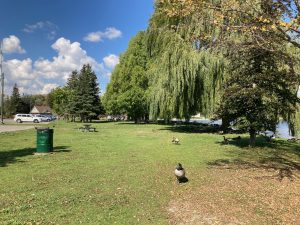
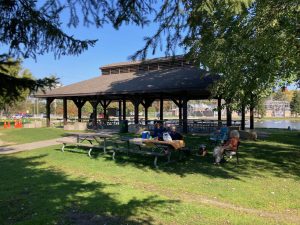
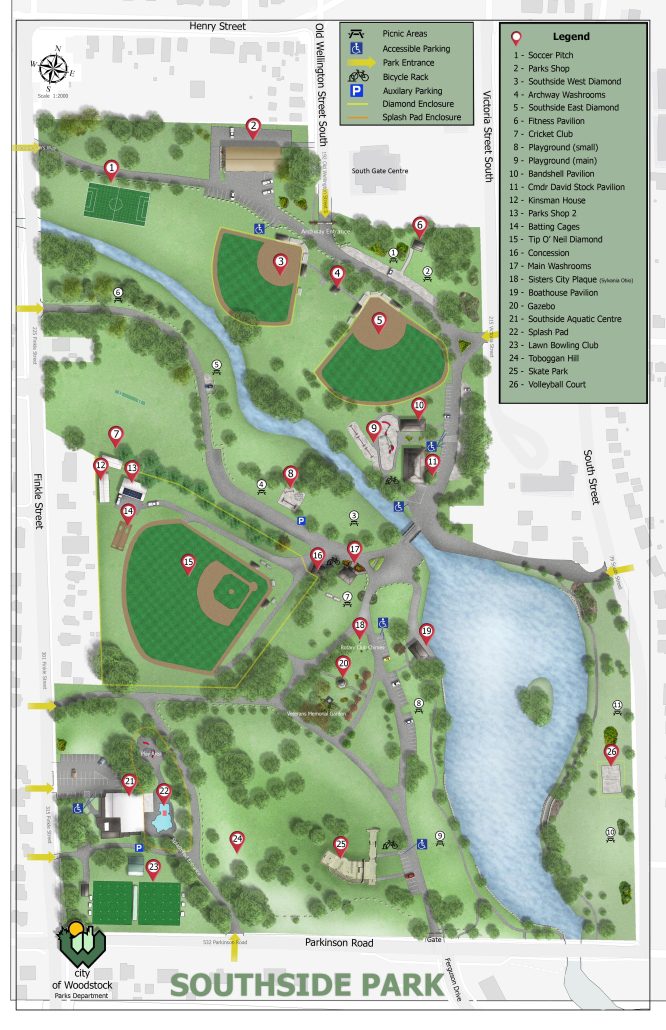
Note 1
I highly recommend Why Orwell Matters (2002) by Christopher Hitchens along with other books by and about George Orwell. A list of good resources includes:
List of books and other resources about Orwell – Stratford Public Library
List of books and other resources about Orwell at Toronto Public Library
George Orwell, 1903-1950 – Toronto Public Library (a more concise list)
George Orwell – Criticism & Interpretation – Toronto Public Library
Why Orwell Matters (2002)
Wifedom: Mrs. Orwell’s Invisible Life (2023)
Orwell’s Roses (2021)
George Orwell, 1903-1950 – Homes and haunts – Toronto Public Library
Background on Russia and Ukraine – Toronto Public Library
George Orwell and Russia (2023)